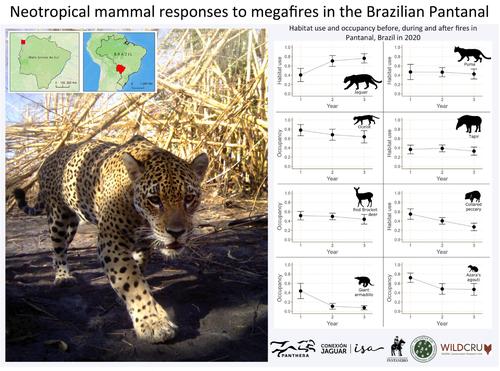当前位置:
X-MOL 学术
›
Glob. Change Biol.
›
论文详情
Our official English website, www.x-mol.net, welcomes your feedback! (Note: you will need to create a separate account there.)
Neotropical mammal responses to megafires in the Brazilian Pantanal
Global Change Biology ( IF 11.6 ) Pub Date : 2024-04-24 , DOI: 10.1111/gcb.17278 Rocío Bardales 1, 2 , Valeria Boron 2, 3 , Diego Francis Passos Viana 4 , Lara L. Sousa 1 , Egil Dröge 1, 5 , Grasiela Porfirio 4 , Maricruz Jaramillo 2 , Esteban Payán 2, 6 , Claudio Sillero‐Zubiri 1 , Matthew Hyde 2, 7
Global Change Biology ( IF 11.6 ) Pub Date : 2024-04-24 , DOI: 10.1111/gcb.17278 Rocío Bardales 1, 2 , Valeria Boron 2, 3 , Diego Francis Passos Viana 4 , Lara L. Sousa 1 , Egil Dröge 1, 5 , Grasiela Porfirio 4 , Maricruz Jaramillo 2 , Esteban Payán 2, 6 , Claudio Sillero‐Zubiri 1 , Matthew Hyde 2, 7
Affiliation

|
The increasing frequency and severity of human‐caused fires likely have deleterious effects on species distribution and persistence. In 2020, megafires in the Brazilian Pantanal burned 43% of the biome's unburned area and resulted in mass mortality of wildlife. We investigated changes in habitat use or occupancy for an assemblage of eight mammal species in Serra do Amolar, Brazil, following the 2020 fires using a pre‐ and post‐fire camera trap dataset. Additionally, we estimated the density for two naturally marked species, jaguars Panthera onca and ocelots Leopardus pardalis . Of the eight species, six (ocelots, collared peccaries Dicotyles tajacu , giant armadillos Priodontes maximus , Azara's agouti Dasyprocta azarae , red brocket deer Mazama americana, and tapirs Tapirus terrestris ) had declining occupancy following fires, and one had stable habitat use (pumas Puma concolor ). Giant armadillo experienced the most precipitous decline in occupancy from 0.431 ± 0.171 to 0.077 ± 0.044 after the fires. Jaguars were the only species with increasing habitat use, from 0.393 ± 0.127 to 0.753 ± 0.085. Jaguar density remained stable across years (2.8 ± 1.3, 3.7 ± 1.3, 2.6 ± 0.85/100 km2 ), while ocelot density increased from 13.9 ± 3.2 to 16.1 ± 5.2/100 km2 . However, the low number of both jaguars and ocelots recaptured after the fire period suggests that immigration may have sustained the population. Our results indicate that the megafires will have significant consequences for species occupancy and fitness in fire‐affected areas. The scale of megafires may inhibit successful recolonization, thus wider studies are needed to investigate population trends.
中文翻译:

新热带哺乳动物对巴西潘塔纳尔湿地特大火灾的反应
人为火灾日益频繁和严重可能对物种分布和持久性产生有害影响。 2020 年,巴西潘塔纳尔湿地发生的特大火灾烧毁了该生物群落 43% 的未烧毁面积,并导致野生动物大量死亡。我们使用火灾前和火灾后相机陷阱数据集调查了 2020 年火灾后巴西阿莫拉尔山八种哺乳动物物种栖息地利用或占用的变化。此外,我们还估计了两种自然标记物种美洲虎的密度虎豹 和豹猫豹豹 。在这八个物种中,有六个(豹猫、项圈西貒)双子叶植物 , 巨型犰狳大齿齿象 , 阿扎拉刺豚鼠杜鹃花蝇 , 红花鹿美洲马扎马, 和貘貘 )在火灾后占用率下降,其中一个栖息地使用稳定(美洲狮美洲狮 )。大火后,巨型犰狳的入住率急剧下降,从 0.431 ± 0.171 降至 0.077 ± 0.044。美洲虎是唯一栖息地利用不断增加的物种,从 0.393 ± 0.127 增加到 0.753 ± 0.085。捷豹密度多年来保持稳定(2.8 ± 1.3、3.7 ± 1.3、2.6 ± 0.85/100 公里2 ),而豹猫密度从 13.9 ± 3.2 增加到 16.1 ± 5.2/100 km2 。然而,火灾期后重新捕获的美洲虎和豹猫数量较少,表明移民可能维持了种群数量。我们的结果表明,特大火灾将对受火灾影响地区的物种占用和适应性产生重大影响。特大火灾的规模可能会抑制成功的重新殖民,因此需要更广泛的研究来调查人口趋势。
更新日期:2024-04-24
中文翻译:

新热带哺乳动物对巴西潘塔纳尔湿地特大火灾的反应
人为火灾日益频繁和严重可能对物种分布和持久性产生有害影响。 2020 年,巴西潘塔纳尔湿地发生的特大火灾烧毁了该生物群落 43% 的未烧毁面积,并导致野生动物大量死亡。我们使用火灾前和火灾后相机陷阱数据集调查了 2020 年火灾后巴西阿莫拉尔山八种哺乳动物物种栖息地利用或占用的变化。此外,我们还估计了两种自然标记物种美洲虎的密度



























 京公网安备 11010802027423号
京公网安备 11010802027423号